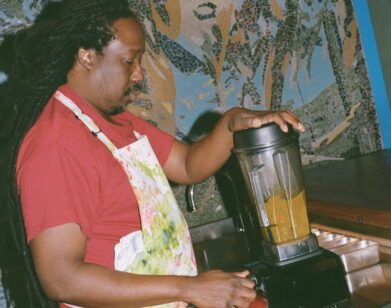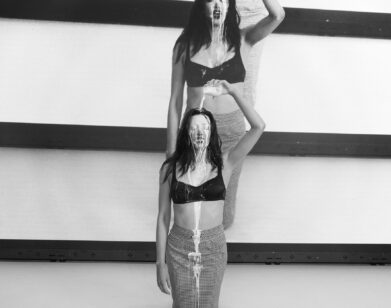Lily Koppel Brings the Space Race Down to Earth

ABOVE: LILY KOPPEL
Lily Koppel’s The Astronaut Wives Club (Grand Central) is a space odyssey with a human touch. This real life story of America’s quest to conquer outer space in the 1960s focuses on the women who supported their astronaut husbands, despite months apart and intense public inquiry. Koppel expertly weaves scientific research with moving human stories as the wives deal with worldwide scrutiny, instant fame, and the pressures of their husbands suddenly becoming larger-than-life figures investigating the final frontier. Americans have always been obsessed with exploration, and this reached a fever pitch at the height of the Space Race. With style, grace and insight, Koppel explores the lives of the women behind the moon landing—a spotlight these strong, dynamic figures well deserve. We spoke with Koppel about space style, lunar martinis, the crushing pressures of having an astronaut husband, intergalactic travel, and why we are so compelled with the question of what is out there.
ROYAL YOUNG: How did you become interested in space and the astronaut wives?
LILY KOPPEL: Well, I’m not a space writer, obviously, but I had bought this big photo book of the moon landing. One Saturday I was looking at pictures of the moon and galaxies. Space images, in a way, are very masculine; they’re all about conquering astronauts in their marshmallow suits. Then I turn the page and there are pictures of these wives in mini-dresses and beehives. And it was such a delicious contrast to the lunar surface, which is already so fashionable in itself, like Betty Crocker cake mix. You just get attached to certain stories that don’t let you go.
YOUNG: Was it about the contrast between the final frontier and conquering versus the mini-skirts, or was it a deeper interest also in space and exploration?
KOPPEL: Besides seeing images of Lilly Pulitzer- and Pucci-clad wives, knowing they were married to astronauts, that captured my imagination about space, obsession, and love. What was intoxicating to me about the astronaut wives’ story was that it was a mix of science, exploration, the surreal—and also about love and that emotional journey. The astronauts themselves were very scientific men, and everyone wanted to know how they felt, but they would only spout numbers and vectors. I felt the wives would have a story that was more human, American gold.
YOUNG: There had to have been emotions behind landing on the moon; do you feel like you ever found out what they were?
KOPPEL: I do. Apollo 11 was the movie premiere of moon landings, with Neil Armstrong and Buzz Aldrin. Neil was a bit of a mystic, but also a taciturn guy, from what I can tell. He really saw the moon as looking like the American high desert. He wasn’t someone who dealt in metaphors. With Buzz, he flipped out that he was the second man on the moon. That’s outrageous, but he thought that was subpar. That marriage ended up falling apart, because his wife—after 10 years of waiting for him to train for this mission—felt like, When are you going to come down to earth and just be a dad and husband?
YOUNG: I felt like there were a lot of cracks in the families because of the blind devotion and patriotism that was demanded.
KOPPEL: Yes, because that’s what our country demanded, that’s what NASA demanded, that’s what LIFE Magazine, who purchased their life rights, demanded.
YOUNG: Though the images LIFE was presenting weren’t fractured images. They took complicated lives and streamlined them into perfect American heroes, which must have been confusing and weird.
KOPPEL: I think it made for a very awkward situation, but maybe the ’50s and ’60s were more awkward because everyone knew there were things under the surface, but no one talked about them.
YOUNG: I was thinking about the American frontier, that is such a huge part of our culture. America was discovered and then we explored the West. Do you feel like when the space race was happening and the Russians launched Sputnik, we were so upset as a country because we felt space was our birthright?
KOPPEL: Absolutely. I think Americans today look at the moon and think of it like apple pie or Coca-Cola. It’s American. We planted our flag there. We see ourselves in it and don’t like the idea of anyone else taking over the moon. It was so funny to read about how we did plan to colonize the moon and I’m sure if we had, kids would be studying it now, our interplanetary endeavors. There was going to be a lunar Hilton. Pan Am offered the first flight to the moon, and people were signing up, including astronaut wives. It was a fever. It was like people thought of the moon like going to the Bahamas.
YOUNG: [laughs] I wish!
KOPPEL: [laughs] It’s like a Jet Blue special: go to the moon!
YOUNG: Incredible. Imagine drinking on the moon and looking down at earth.
KOPPEL: A lunar martini. Looking back on the earth must be an amazing moment. That also defined the whole green movement, looking back at this blue marble. I’ve met a lot of the astronauts, which was such an incredible experience. They’re all very macho guys, like fighter pilots, but then there’s a mysticism about them. But they never sent an artist up there.
YOUNG: Do you think they should?
KOPPEL: Oh, definitely.
YOUNG: Why has no one gone back to the moon since 1972?
KOPPEL: Interest fell off during the Nixon presidency. There was a feeling that we kept on repeating the same mission. Americans weren’t interested in minute scientific discoveries. The wives always had this joke about Mars, like, “Ugh, don’t send them to Mars.” That would have been two years, to send them there and back.
YOUNG: It’s crazy how much the personal guides the scientific.
KOPPEL: Well, what’s really interesting about the wives’ story is just seeing the whole Space Race on a human level, on a level that took blood, sweat, and tears; and a lot of it was felt by the women involved, because these men were basically absentee husbands. I mean they were heroes, but the book sort of investigates what an American hero is. The women were basically presenting the front to the world.
YOUNG: Did you feel like there was a disconnect between these very wholesome women and American families and this very wild, outlandish, mystical journey of going to the moon?
KOPPEL: Americans are obsessed with wild, outlandish things. Marilyn Monroe, Mickey Mouse, and Michael Jackson are all wild, outlandish things. All these wives tried very hard to fit that Stepford wife model, but all of them were incredibly distinct, different and strong.
THE ASTRONAUT WIVES CLUB IS OUT TOMORROW.






